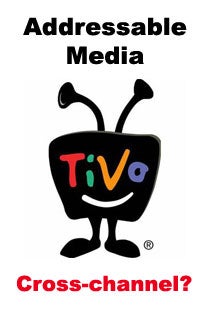 Here’s today’s AdExchanger.com news round-up… Want it by email? Sign-up here.
Here’s today’s AdExchanger.com news round-up… Want it by email? Sign-up here.
Addressing TV Audience
According to The Wall Street Journal’s Jessica Vascellaro, Tivo is dipping its toes more firmly into the addressable media world by “expanding its service that allows advertisers to see how many and what kind of users are viewing their commercials.” What’s more they’ve made a site which lets marketers see how their competitors faring in the TV commercial Tivo world –reminiscent of Compete’s website services. Read the article. And, visit http://tivo.com/ad-scorecard. It’s free! Hovering somewhere near this deal could be Quantcast. It seems possible that the Quantcast user panel data from the Tivo box (announced a while ago) could be mapped to performance data for PC-based display ads via millions of Quantcast website pixels. And then, poof!, let the digital audience buying begin cross-channel and IN to the television. Quantcast would appear to be well-positioned to provide cross-channel attribution modeling – a Holy Grail – and likely one reason for Cisco Systems taking a position in Quantcast in 2010. The WSJ notes that Simulmedia and Rentrak are in the mix, too.
MySpace, TheirSpace
It’s no surprise that News Corp. is throwing up its hands about MySpace, which has been troubled since it was acquired in 2005 for $580 million. News Corp. COO Chase Carey told investors during the company’s earnings call that despite “some very encouraging metrics… the plan to allow MySpace to reach its full potential may be best achieved under a new owner.” He later elaborated on the point in an interview with paidContent’s Robert Andrews, saying that the company isn’t necessarily considering a sale. The change could include sharing the burden of running the social net with an investor. Read more. Earlier, Andrews had reported that the Digital Media Group, which houses MySpace, was responsible for the “other” revenue segment jumping by $31 million to $156 million this quarter – “stemming largely from lower search and advertising revenues at MySpace.” Read the rest here.
NYT Display Rises, About Falters
Despite the ad recovery of the past year, print is still struggling to gain ad revenue. Meanwhile, NYTCo revenue surged in Q4: digital advertising dollars rose 11.1 percent to $113.2, as print fell 7.2 percent. For the full year, the NYTCo’s digital revenues grew 14.8 percent to $387.3 million. One surprising area was the decline at the About Group, which was regarded as the company’s digital powerhouse saw revenues slip 3 percent to $35.2 million. The blame was placed on lower cost-per-click and display advertising for About, which has faced greater challenges from content farms and social media. The decrease in cost-per-click advertising was a result of lower page views and click-through rates. Read the release.
Verve Buys Deconstruct
Mobile ad network Verve Wireless has bought Deconstruct Media, an ad tech firm also operating in the mobile arena. Terms of the deal weren’t disclosed. The merger is represents a reunion of former AOL executives. Verve recently named Tom MacIsaac, the former head of Lightningcast, an online video ad company acquired by AOL in 2006, as CEO, while Deconstruct is staffed by many former Advertising.com execs, starting with Brent Halliburton, Deconstruct’s founder and CEO, who was senior director of New Product Development at the AOL unit. Halliburton will now serve as Verve’s VP of product management. Read the release. Halliburton offers some personal thoughts about the creation of Deconstruct and the ultimate sale on his blog, Cogmap.
In-Text In Context
Contextual advertising and buying search keywords is the standard way to make brand messages “relevant” to in-market web surfers. ClickZ’s Tessa Wegert has pointed out a slight variation on the theme. She suggested looking into a Vaseline campaign that used the contextual approach with Vibrant’s in-text ads. The company claimed to get a pretty notable lift for brand awareness, favorability, recall, and purchase consideration. By binding the ad and the context so inextricably, users are said to get a greater sense of the “brand essence.” Read more.
FreeWheel’s Payment Plan
Online video services company FreeWheel has introduced a complementary product to content syndication offering called Revenue & Payments Management. RPM – yes, they made the connection about sharing the acronym for Revolutions Per Minute – is essentially an all-in-one invoicing system for online publishers and distributors. The product has two parts: one for contracts with advertisers and another with distribution partners. The main selling point: FreeWheel promises to cut down on those usual “discrepancies” when it comes to paying and getting paid. More details on FreeWheel’s blog.
Analyze, Optimize, Learn. Repeat.
No one complains about not having enough data. The problem is that it’s so hard to do anything with it in a time frame that matters – i.e., real-time. So says PHD’s Abby Luther, writing on MediaBizBloggers. In the old days of print and broadcast, there was no need for actionable data in real-time. But now, if you’re advertising to a smartphone or tablet user, you need to be able to shift gears on a dime. Instead of spending 80 percent of their time planning media buys, agencies need to focus the bulk of their work on “analyzing, optimizing and learning.” Read more.
Oil And Data
Drilling for deep for oil the unfathomably deep tar sand reserves of Alberta, Canada serves as a metaphor for mining for data on the Internet, in an opinion piece by Michael Driscoll and Roger Ehrenberg on GigaOm. The two execs carry the analogy further, saying the data, like oil, needs to be finely distilled before it can be of use. Therefore, “machine learning,” a principal component driving value in the industrial age of data. The refining comes as statistics are blended with computer science to classify and predict patterns in data. Read more.
Havas Taps Experian Hitwise
These days, ad agencies and tech firms are falling over each other to buy analytics companies. But why spend the millions and billions of dollars if you don’t have to? Media buying agency Havas Digital is taking the old approach of simply hiring a company for their service offerings. The Euro RSCG shop has tapped audience metrics provider Experian Hitwise to serve as its global consumer insights provider. The deal gives Havas complete access to Experian Hitwise’s demographics tools, as well as products such as “Mosaic lifestyle segmentation,” online traffic analytics from Clickstream and its Search Intelligence. Read the release.
Complexity Made Simple
Building a big data stack for processing, analyzing, and visualizing nearly one trillion ad pricing actions may sound simple – okay, it doesn’t sound simple at all. Still, the folks at Metamarkets say that they were able to make it happen by following some basic rules, notably to keep experimenting, keep debating and keep trying, even if you don’t necessarily understand the solutions you’re trying to implement. Read more.
Facebook’s Congressional Moment
Congressional targeting watchdogs, Reps. Ed Markey, D-Mass., and Joe Barton, R-Tex., the co-chairmen of the House Bi-Partisan Privacy Caucus, have demanded that Facebook CEO Mark Zuckerberg provide more details on an opt-in feature that lets users share their addresses and mobile phone numbers with third party websites and apps. So far, Facebook has suspended the roll out of the service after complaints made the rounds of the blogosphere, but it has indicated it would revive the initiative, Mediaweek’s Katy Bachman reports. Read more.
Billboards.com?
When it comes to old media, billboards are as classic as they come. The WSJ’s Spencer Ante writes that billboards are getting the pay-for-performance treatment that has been the province of online for so long. Google, Nokia Corp. and France Telecom SA’s Orange have tested some campaigns that allow users to interact with kiosks at bus stops, phone booths, train stations and airports in cites including New York and London. Read more.
New Chairman Of The Board
In an announcement on Tuesday, The Interactive Advertising Bureau in the U.S. announced that it has a new chairman – IDG CEO Bob Carrigan. Read the release. Simulmedia’s Dave Morgan bids a fond chairmanship-farewell to the former Chairman, David Moore, in a column on MediaPost saying, “Of those thousands of online ad CEOs in the late 1990s, Dave is one of the few last men standing, one still running his original company — something most of us expect him to continue doing for many years to come.” Read more.
You’re Hired!
Online video ad network Open Book Video – profiled last year here – has been shut down according to PaidContent’s Joseph Tartikoff as its former CEO has joined demand-side platform [x+1] “where he will now be SVP of media solutions and will focus on that company’s ‘media sourcing, campaign management and clients’ strategy.'” Read more.












